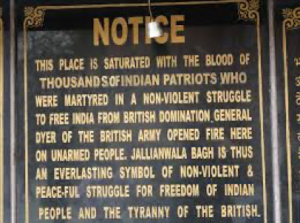The Amritsar massacre
 Contemporary letter to The Times
Contemporary letter to The Times
To the Editor. February 24, 1920,
Sir, It will ultimately rest with the British public, through their representatives in Parliament, to decide as to the culpability of its various servants concerned in the massacre and other disgraceful doings at Amritsar and Lahore. As one who was present at the scene of the disturbances and take some interest in the honour of British administration abroad, I take exception to the version which Sir Michael O’Dwyer has given in his letter from Delhi, published in your issue of the 9th inst as being highly coloured and tending to mislead.
On April 10 there were riots in Amritsar, due to the arrest and deportation without judicial inquiry or trial of two leading agitators against the passing of the Rowlatt Bill, which had been opposed by all the Indian members of the Viceroy’s Legislative Council. These were suppressed the same day by the police firing on the crowd, and calm prevailed till April 13, the day of the massacre. The military had arrived and taken over charge from the civil officials who, without the authority of the Supreme Government, surrendered their charge. And, it would appear, the situation was well in hand, the military having complete control for three days, and there being no rioting whatsoever during that period. Nevertheless, this situation is described by Sir Michael O’Dwyer as “a state of open rebellion”, and again in these words, “rebellious mobs were in possession of the great city of Amritsar”. This is a distortion of the facts. The mere disobedience by a crowd of an order forbidding the holding of meetings was made the occasion for shooting some thousands of them when, according to General Dyer himself, they might have dispersed if he had ordered them to, and it was to this that Sir Michael O’Dwyer accorded his approval. Sir Michael’s letter is ominously silent as to what action he took to correctly inform the Viceroy of the true ature of the occurrence of April 10, and as to any of the facts which would account for the British public being kept in ignorance of what really happened at Amritsar and Lahore while he held the office which he was relieved of on May 28, 1919.
I am, Sir, your obedient servant, E Beechey, Wellington Club, Amritsar